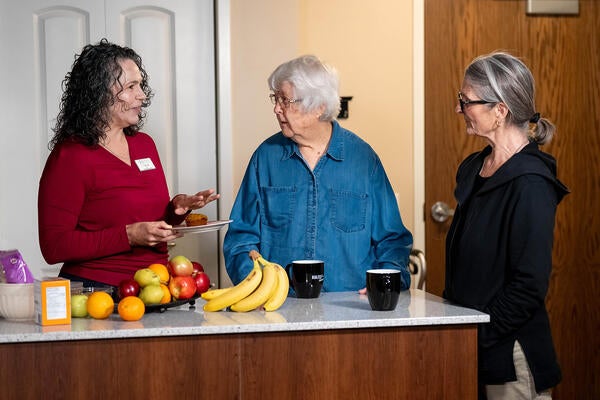
New play challenges dementia stereotypes
Theatre group works with Waterloo researcher to change the way families and health care practitioners think about dementia

Theatre group works with Waterloo researcher to change the way families and health care practitioners think about dementia
By Christine Bezruki Faculty of Applied Health SciencesIt all started with a Leonard Cohen song. Now, a play inspired by a line of lyrics in Cohen’s song, Anthem, has taken on a life of its own and is changing the way families and support staff approach dementia care.
In January, the research-based drama Cracked: New Light on Dementia will run at several venues in Toronto, including an event at the Ontario Science Centre. The new play raises questions about many of the dehumanizing practices that still prevail in care settings and gives family members and support staff better ways to interact with persons living with the disease.
“The play is inspired by the lyrics: ‘There is a crack in everything, that’s how the light gets in’,” said Sherry Dupuis, a professor in Waterloo’s Faculty of Applied Health Sciences, who led the project. “The play challenges dementia as an unmitigated tragedy and shows just how flawed and one dimensional society’s view of the disease is.”

An original oil painting by Cracked researcher Gail Mitchell portrays lyrics from Leonard’s Cohen’s song, Anthem.
Currently, approximately one million Canadians are living with Alzheimer’s disease or a related dementia. After cancer, it is the most feared disease in Canada.
"With cancer the fear is death, with dementia people fear a loss of self. We wanted to challenge how we think about dementia,” said Dupuis. “People with dementia do not lose personhood and have the ability to live well, especially when they have strong, compassionate supportive relationships.”
Written collaboratively by a team of researchers, a playwright, a group of professional actors, and persons actually living with dementia, the play follows two families as they learn how to navigate relationships and support each other after a dementia diagnosis.
“With dementia, relationships often become strained or non- existent because of the fear and misunderstanding surrounding the disease,” Dupuis said. “In addition, many policies and practices in long term care homes limit the ability of staff to develop strong relationships and really care for their residents in a human and life affirming way.”
To counter current care challenges, Cracked provides viewers with new ways of seeing persons with dementia, and proposes care methods that help foster strong relationship and preserve dignity.
“The real beauty of the play is that staff and family members can see a different way of caring, rather than reading about it or hearing about it in a lecture. It’s very powerful that way because they feel the story at a very visceral, emotional level,” said Dupuis.
Performances held in long term care homes are helping the researchers examine changes in understanding and actions among staff members.
“We know from research that traditional ways we education staff in dementia care is not always effective,” said Dupuis. “Plays like Cracked could be the key to inspiring change in care practices.”
Find out more about performance dates and ticket information.

Read more
How machine learning empowers collaboration between computer science, math and medical research

Read more
Dr. Heather Keller discusses the need to transform mealtimes in Canada’s long-term care homes from a service to a meaningful form of care

Read more
“I’m just like you.”
The University of Waterloo acknowledges that much of our work takes place on the traditional territory of the Neutral, Anishinaabeg, and Haudenosaunee peoples. Our main campus is situated on the Haldimand Tract, the land granted to the Six Nations that includes six miles on each side of the Grand River. Our active work toward reconciliation takes place across our campuses through research, learning, teaching, and community building, and is co-ordinated within the Office of Indigenous Relations.